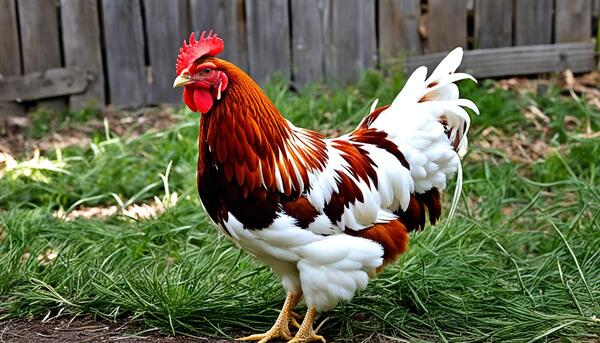Chickens are more than just a source of eggs and meat—they are a window into evolution, biodiversity, and human culture. This guide dives deep into the many species, breeds, and uses of chickens worldwide, from backyard pets to commercial production giants. Let’s explore the world of chickens together!

What Is a Chicken Species?
The Evolution of Chickens: From Wild to Domestic
Popular Chicken Species and Breeds
Chicken Breeds for Eggs, Meat, and Dual Purposes
Rare and Exotic Chicken Breeds
The Role of Chickens in Culture and History
Global Chicken Consumption: Numbers and Trends
How to Choose the Right Chicken Breed
Preserving Chicken Diversity: Why It Matters
Let’s start with the basics. A chicken species refers to a group of chickens that share common traits and genetic characteristics. Domesticated chickens (Gallus gallus domesticus) come from their wild ancestor, the red junglefowl (Gallus gallus). While "species" often refers to broader classifications, most chicken enthusiasts talk about "breeds" within the domestic chicken species.
Chickens are believed to have been domesticated around 8,000 years ago in Southeast Asia. The red junglefowl is their closest wild relative, but over centuries, humans have selectively bred chickens for traits like egg production, meat quality, and even appearance.
Did you know? Chickens are now found in nearly every corner of the world, thanks to their adaptability and usefulness to humans.
Chickens come in all shapes, sizes, and colors. Here are some of the most well-known breeds:
Leghorn: Famous for their egg-laying capabilities.
Rhode Island Red: A hardy dual-purpose breed.
Silkie: A fluffy, unique breed often kept as pets.
Sussex: Known for both meat and eggs.
Araucana: Famous for their blue eggs.
Bantam: Small chickens often kept as ornamental pets.
Each breed has unique characteristics, whether it’s the number of eggs they lay or their striking feather patterns.
Chickens serve various purposes depending on the breed:
Leghorn: Lays up to 300 eggs a year!
Australorp: A prolific layer with a gentle temperament.
Cornish Cross: The king of commercial meat production.
Bresse: A French delicacy known for its flavor.
Rhode Island Red: Reliable for both eggs and meat.
Plymouth Rock: A versatile and friendly choice.
This classification helps farmers and hobbyists choose chickens that match their needs.
Some chicken breeds are so unique that they seem almost mythical:
Ayam Cemani: Known as the "Goth Chicken," this Indonesian breed is entirely black, from feathers to bones.
Onagadori: A Japanese breed with stunning, meter-long tail feathers.
Phoenix: Another long-tailed breed with dazzling plumage.
These breeds are often expensive and require special care but are prized for their beauty and rarity.
Chickens have been part of human culture for millennia.
In ancient Rome, chickens were used for divination.
Chickens feature prominently in Chinese zodiac signs.
Modern cultures celebrate chickens through festivals and art.
Beyond symbolism, chickens have played a vital role in sustaining human life.
Chickens are the world’s most consumed protein source. Here's a breakdown of annual chicken consumption by breed, starting with the most widely consumed:
| Rank | Breed/Type | Annual Global Consumption (in tons) | Primary Use |
|---|---|---|---|
| 1 | Cornish Cross | 65,000,000 | Meat |
| 2 | Leghorn | 12,000,000 | Eggs |
| 3 | Rhode Island Red | 9,000,000 | Dual-purpose |
| 4 | Plymouth Rock | 7,500,000 | Dual-purpose |
| 5 | Bresse | 4,000,000 | Meat (specialty) |
Cornish Cross dominates meat production due to its fast growth, while Leghorns are the champions of egg production.
Picking the right chicken breed depends on your goals:
For eggs, go with Leghorns or Australorps.
If you want meat, Cornish Cross or Bresse are excellent choices.
For a balance of both, dual-purpose breeds like Rhode Island Reds shine.
Ornamental enthusiasts may prefer Silkies or Phoenix chickens.
Remember to consider climate, space, and your level of experience when selecting a breed.
As commercial chicken farming grows, some heritage breeds are at risk of extinction. Preserving rare breeds like the Onagadori or Ayam Cemani is crucial for maintaining biodiversity and genetic resources. Supporting small-scale farmers and breeders can help protect these unique birds for future generations.
Chickens are more than just farm animals—they are a testament to human ingenuity, cultural heritage, and nature’s diversity. Whether you’re a farmer, a backyard chicken keeper, or simply curious about these fascinating creatures, understanding chicken species and breeds can deepen your appreciation for these incredible birds.
From the prolific egg-laying Leghorn to the majestic Onagadori, chickens offer something for everyone. Let’s celebrate their contributions to our lives and work together to protect their future.
animal tags: Chickens
We created this article in conjunction with AI technology, then made sure it was fact-checked and edited by a Animals Top editor.